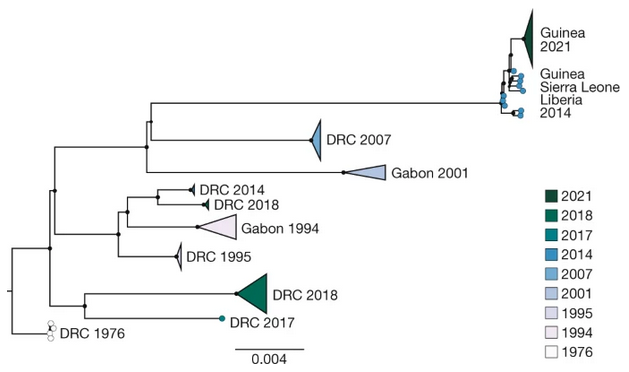Lessons from renewed Ebola outbreak in Guinea
Ebola can apparently reappear years later
Conakry/ Hamburg, September 15th, 2021 – Contrary to previous assumptions, Ebola virus epidemics do not necessarily originate from animal transmissions. The most recent outbreak in Guinea can be traced back to the epidemic in West Africa from 2014 to 2016. This is what an international team involving researchers from Guinea, France, Senegal, Great Britain, Switzerland, Belgium, the USA, and Germany has discovered. A corresponding publication has appeared in the renowned scientific journal Nature. The Bernhard Nocht Institute for Tropical Medicine (BNITM) is involved with prominent authorship.
Ebola virus outbreaks are usually the result of so-called spillover events, which are transmissions from animals to humans. The most recent outbreak in Guinea between February and June of this year was also initially assumed to be a spillover event. In order to test which drugs and vaccines could help contain the outbreak, an international research team analysed samples from sick people and sequenced the nucleic acid of the virus contained in them - with surprising results: the viruses were closely related to those that had caused the severe epidemic from 2014 to 2016 in West Africa. The nucleic acid sequence had changed only slightly. Less than would be expected in a new spillover event and less than would be expected in a sustained human-to-human transmission.

This so-called genomic characterisation of the virus was of outstanding importance for health management on the ground. The virus was a Zaire Ebola virus. This made it clear that the available drugs and vaccines were working. The authorities immediately started a ring vaccination in the population around the area of the new outbreak. It also became clear: Ebola viruses can apparently survive longer in convalescents than thought. The longest period known so far was three years. Now we have to assume five to seven years, at least in individual cases. Another possibility is that Ebola infections can also continue latently or that patients can suffer relapses and become infectious again.
Prof. Stephan Günther, WHO coordinator of the sequencing in Conakry/Guinea and Head of Virology at the Bernhard Nocht Institute for Tropical Medicine: "The results of this study are really remarkable. We knew that Ebola viruses can survive in body fluids, in the sperm of male survivors for example. But if they can do that for so long, recovered people should be given much more intensive follow-up care, both medically and socially. Because there is a great risk that they will be stigmatised."
Because the virus can re-emerge so late, he said, research should urgently look for effective antiviral agents as well as diagnostic markers to detect and treat latently infected people. In addition, it must be examined whether a subsequent vaccination of Ebola convalescents can prevent the persistence of the virus or at least shorten it.

Original publication
Alpha K. Keita, Fara R. Koundouno, Martin Faye, Ariane Düx, Julia Hinzmann et al: Resurgence of Ebola virus in 2021 in Guinea suggests a new paradigm for outbreaks. Nature Sept. 15th, 2021. https://doi.org/10.1038/s41586-021-03901-9
Related News:
Persistence of infectious Lassa virus in seminal fluid of male survivors after recovery - 09.11.2021
Contact person
Prof. Dr Stephan Günther
Head of Department of Virology
Phone : +49 40 285380-547
Fax : +49 40 285380-459
Email : guenther@bnitm.de
Dr Eleonora Schoenherr
Public Relations
Phone : +49 40 285380-269
Email : presse@bnitm.de
Julia Rauner
Public Relations
Phone : +49 40 285380-264
Email : presse@bnitm.de







